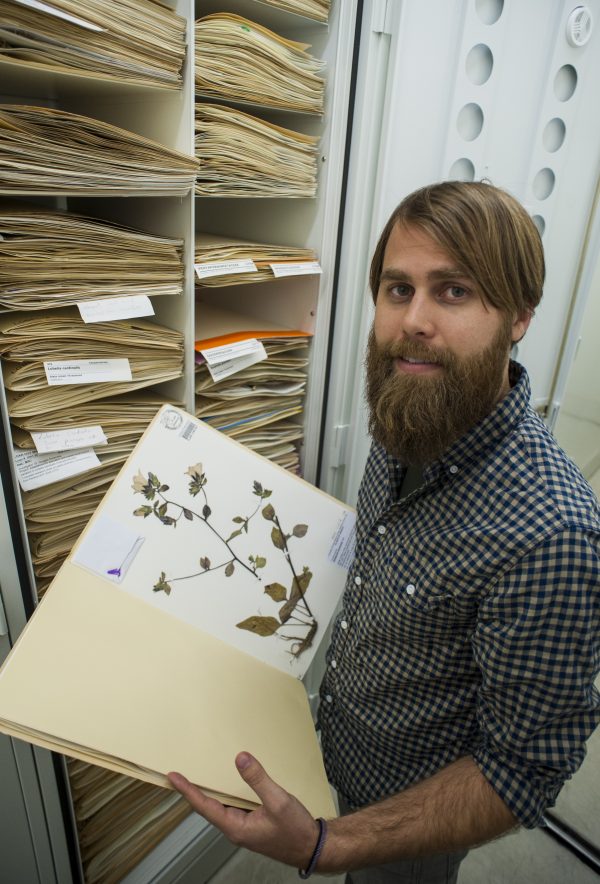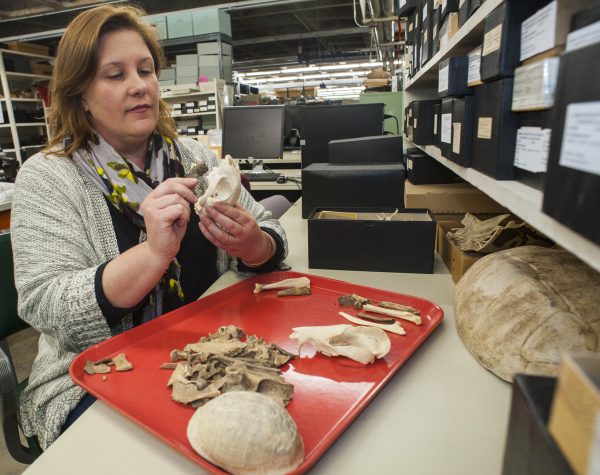The Florida Museum of Natural History recently announced the winners of the 2016 Austin Award and Bullen Award for student research and significant contributions to the development of museum collections and programs.

Florida Museum photo by Jeff Gage
Biology graduate student Andrew Crowl received the Austin Award for his research on the evolution and biogeography of plants, particularly a group of rare Bellflowers restricted to the Mediterranean Basin called the Roucela complex.
Anthropology graduate student Meggan Blessing received the Bullen Award for her research on past human practices using modified bones from Stallings Island, Georgia, a shell-bearing site from the Late Archaic period, about 5,800 to 3,800 years ago.
Crowl collected Bellflower specimens throughout the Greek islands and Mediterranean to learn about the historical processes responsible for the peculiar distribution patterns observed in the group. He analyzed large amounts of DNA sequences to gain information on the plant’s evolutionary relationships.
The study showed that the Roucela complex exhibited a different evolutionary pattern than other plants and animals in the Mediterranean Basin: the diversification of the group is driven by geologic events over time, rather than the onset of the Mediterranean climate. As a result of his extensive fieldwork, hundreds of plant specimens were added to the Florida Museum’s Herbarium collections, including more than 20 species not previously represented. Some of Crowl’s findings are on display as part of a Florida Museum exhibit highlighting ongoing research projects.
Nico Cellinese, associate curator of the Herbarium and informatics at the museum, served as Crowl’s adviser and noted his impressive analytical skills.
“He has an excellent combination of intellectual curiosity, creative thinking and high aptitude for scientific concepts,” Cellinese said.

Florida Museum photo by Jeff Gage
The Austin Award, named in honor of former Florida Museum ornithology curator Oliver L. Austin, recognizes students conducting research in the natural sciences, with preference given to those involved in organism, population and ecosystem studies based on substantial research in the field and in the Florida Museum’s collections.
Blessing, who received the Bullen Award, expanded her master’s research by investigating how Stallings people modified the bones of animals they hunted. The inventory of modified bones includes hand-crafted items for practical purposes, such as deer antlers used as spears to capture large fish for ritual feasts.
Associate museum curator of environmental archaeology Katherine Emery said bone tool analyses like these are uncommon in the southeastern United States, and represent an important contribution to information on how the crafting of animal products is linked to social, economic and political transitions.
Blessing has also identified a number of zooarchaeological collections, processed specimens for the museum’s collections, and most recently helped coordinate the analysis of a large faunal group from south Florida.
“I have been thoroughly impressed by Meggan’s skill, intellect and enthusiasm for collection-based research and hands-on teaching in our laboratory,” said Emery, who mentored Blessing for the past two years.
The Bullen Award honors former Florida Museum archaeology curator Ripley P. Bullen and recognizes students conducting research on the anthropology of Florida or the Caribbean Basin.